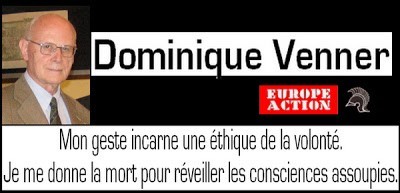
Venner's Bare Bodkin
As a gesture, French ex-paratrooper, veteran right-wing activist, and all around macho badass Dominique Venner’s gunshot-through-the-head self-snuff in the cathedral of Notre Dame sends a powerful message, though I’m not entirely sure what that message is.
One reads Venner’s final words summarizing the rationale for his act, and he truly sounds like a man of sound mind, with a clear-headed notion of aesthetic intent regarding the ramifications of his messy, bloody, brain-splattering final exit at the altar of the historic Paris church. Still, it isn’t easy to discern just how news of an elderly comrade’s suicide is meant to rally the European New Right to fight mass immigration and demographic displacement with any greater determination or ferocity than before. News of a mentor’s auto-annihilation, after all, does not typically have the effect of firing up his pupils or inspiring them to risk their own lives for the cause. Suicide is not martyrdom; whatever we may think of self-slaughter, it cannot be conflated with self-sacrifice. One doesn’t give one’s life for a greater cause, at least not in any obvious way, by directly and deliberately ending it.
 Then again, suicide is almost always a dramatic gesture, thick with a certain pungent and romantic resonance. (Think of Romeo and Juliet, who killed themselves for one another’s sake, and for the glories of eternal love.) Contrary to the tiresome bromides of certain scoldy after-school-special-esque moralists, suicide is most emphatically not a “cowardly” act. Venner’s fiercely uncompromising, literally mind-blowing self-directed strike was bold indeed; it serves as a fittingly emphatic exclamation mark at the end of a fiercely uncompromising life. Normally, self-extinguishment cannot help but translate as an expression of desperate despair, although in certain, culturally-circumscribed cases, it can carry a defiant, “death before dishonor” type of message. Venner, like Yukio Mishima before him, seems to have opted to end his life as a kind of protest against prevailing social trends. Like the famously iconic image of the self-immolating Buddhist monk in Vietnam, he chose to make his death a high profile event, the better to register his posthumous displeasure with the Zeitgeist.
Then again, suicide is almost always a dramatic gesture, thick with a certain pungent and romantic resonance. (Think of Romeo and Juliet, who killed themselves for one another’s sake, and for the glories of eternal love.) Contrary to the tiresome bromides of certain scoldy after-school-special-esque moralists, suicide is most emphatically not a “cowardly” act. Venner’s fiercely uncompromising, literally mind-blowing self-directed strike was bold indeed; it serves as a fittingly emphatic exclamation mark at the end of a fiercely uncompromising life. Normally, self-extinguishment cannot help but translate as an expression of desperate despair, although in certain, culturally-circumscribed cases, it can carry a defiant, “death before dishonor” type of message. Venner, like Yukio Mishima before him, seems to have opted to end his life as a kind of protest against prevailing social trends. Like the famously iconic image of the self-immolating Buddhist monk in Vietnam, he chose to make his death a high profile event, the better to register his posthumous displeasure with the Zeitgeist.
I admit to finding suicide to be a fascinating subject, even to the point of having written a book about it. The continued prevalence of the very phenomenon highlights, I believe, a central paradox of our age. The collapse of established religion in the West over the past few decades has led to a corresponding secularization of attitudes and beliefs, a rise in conspicuous hedonism and brazen worldliness. Restraint, particularly on carnal matters, has evaporated, to the point where people now commonly regard chastity, one of the seven heavenly virtues, as a joke. Even the irreligious weren’t so spectacularly callous about safeguarding innocence in prior times.
Yet in the maw of all of our freely chosen decadence, it seems we still aren’t happy. After all, one would expect that a culture which adopts a “eat, drink, fuck, and be merry” approach to life would want nothing whatsoever to do with death. One would think, in fact, that within such a culture, suicide rates would drop severely, since in a secularized age death cannot be conceived as anything but the fearful negation of life, and life in this world is all that our age can know or ever conceive of believing in, given our hopeless proclivity towards worldliness. Yet every day, for a whole host of individualized reasons yet with the undeniable underlying miseries, people opt to do without the world they know, and instead fly directly to Hamlet’s “undiscovered country, from whose bourn no traveler returns.” For them, unlike for Hamlet, it is better the ills they have are enough to drive them to “make (their) quietus with a bare bodkin.”
That a man like Venner would contrive to “pull a Mishima”—and in a Catholic cathedral, no less!—speaks volumes about the general suicide of the West, spiritually speaking. Even forty or fifty years ago, no European-nurtured activist would have thought to undertake such an act; the ramifications would have been too ghastly, the aura of the event too unseemly, in light of the Christian prohibition of self-harm. Such a prohibition still held currency in the West not too long ago, the widespread decline of faith notwithstanding; today, however, in a glaringly post-Christian age of roiling chaos and bitter upheaval, such niceties have long flown the coop.
Any demographic resurgence of Western man will require a spiritual rebirth of Europe’s traditional beliefs. Perhaps Venner’s blood, shed by his own hand in a forbidden manner on holy ground, can help in some manner to nurture the seeds which will eventually blossom into a new age of rejuvenated, steadfast faith. Who knows? Stranger things have happened in the past. “History,” as T.S. Eliot noted, “has many cunning passages and contrived corridors.”
Andy Nowicki, co-editor of Alternative Right, is a Catholic reactionary writer who loathes all modernist dogmas and superstitions. He is the author of five books, including Heart Killer and The Columbine Pilgrim. He occasionally updates his blog (www.andynowicki.blogspot.com ) when the spirit moves him to do so.




 del.icio.us
del.icio.us
 Digg
Digg
Les commentaires sont fermés.